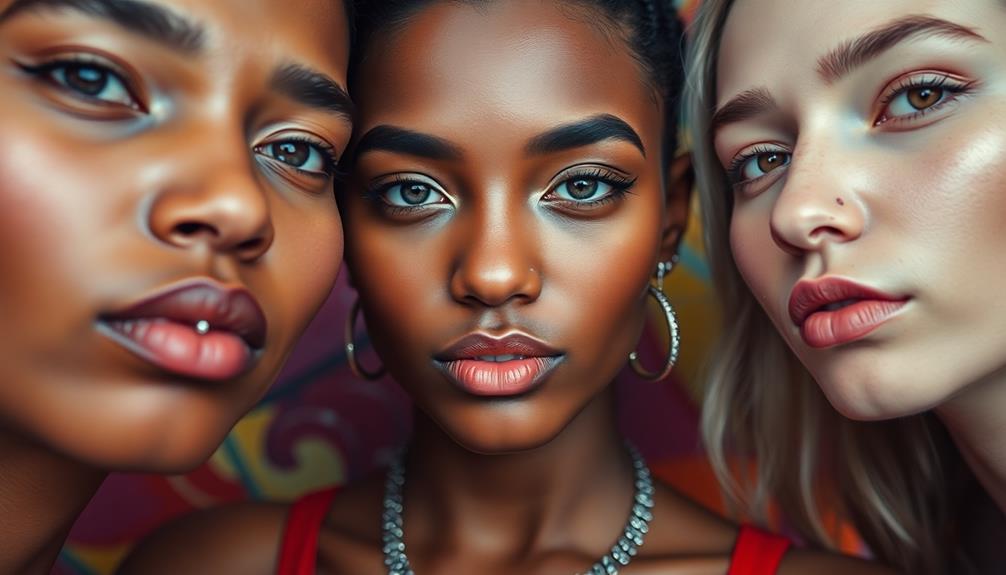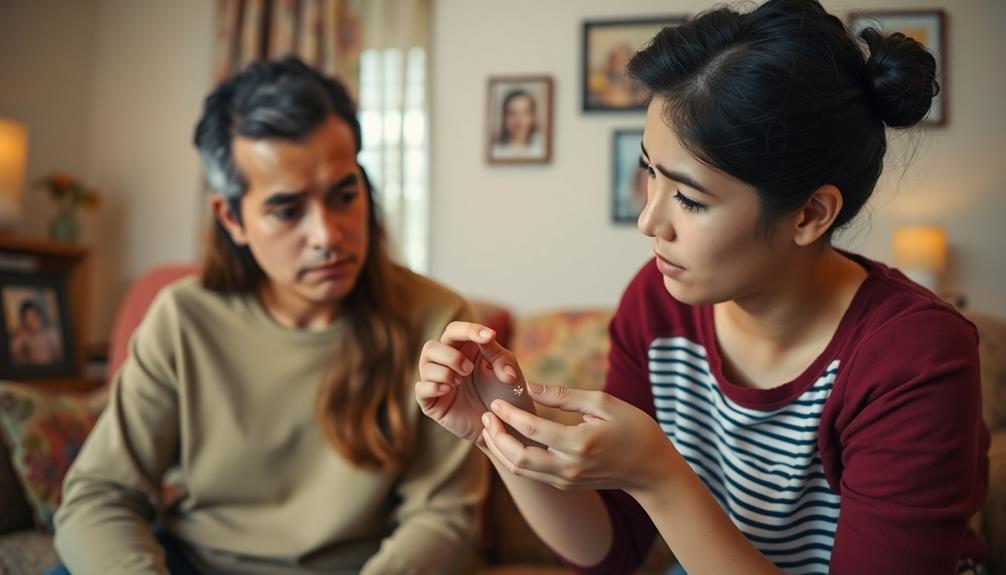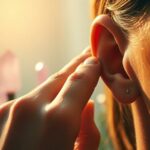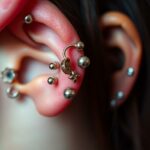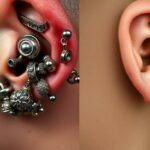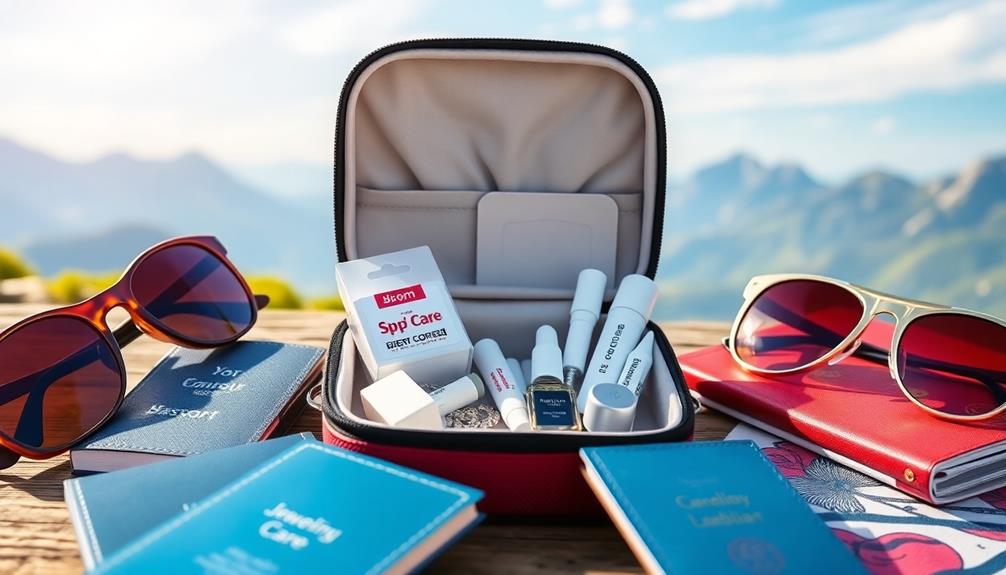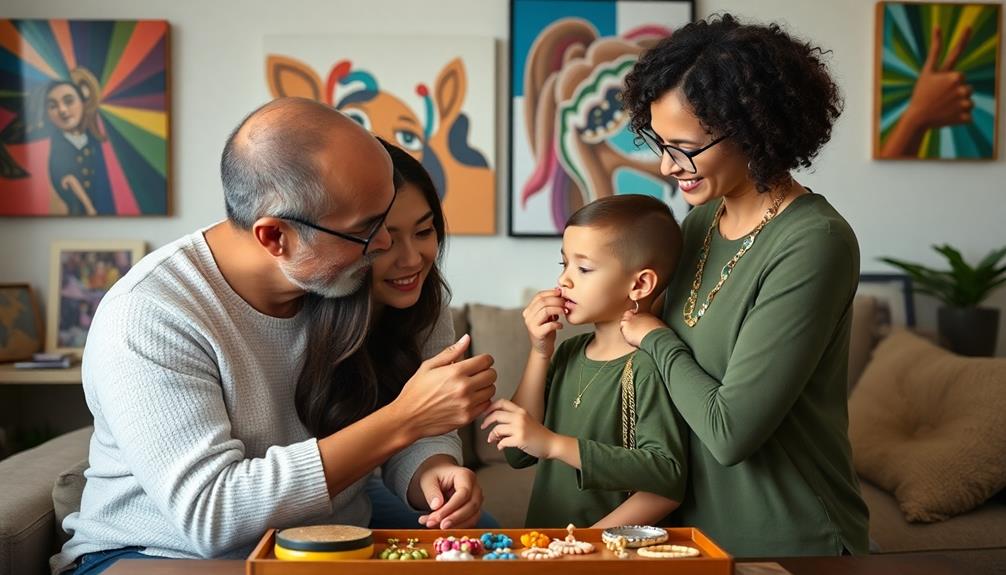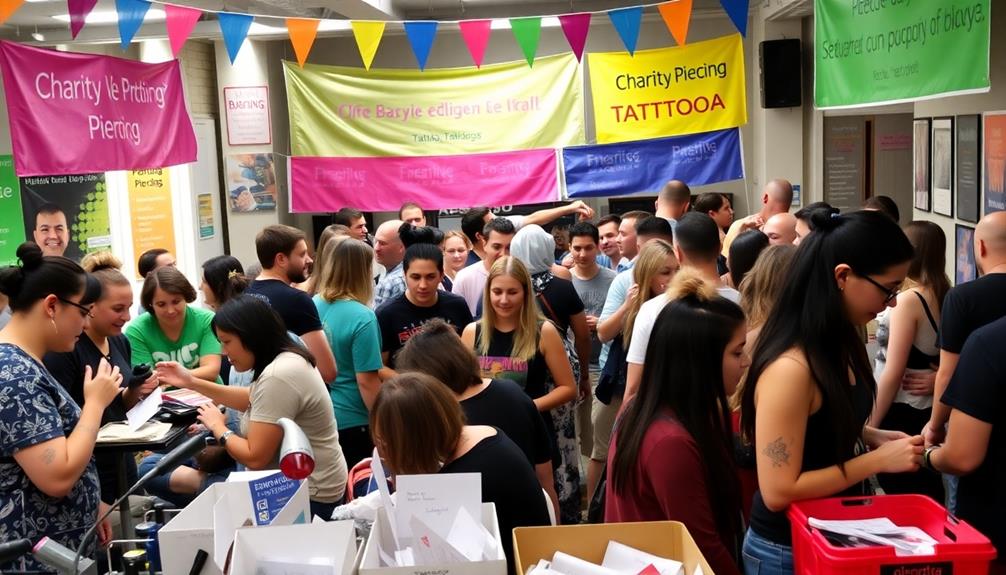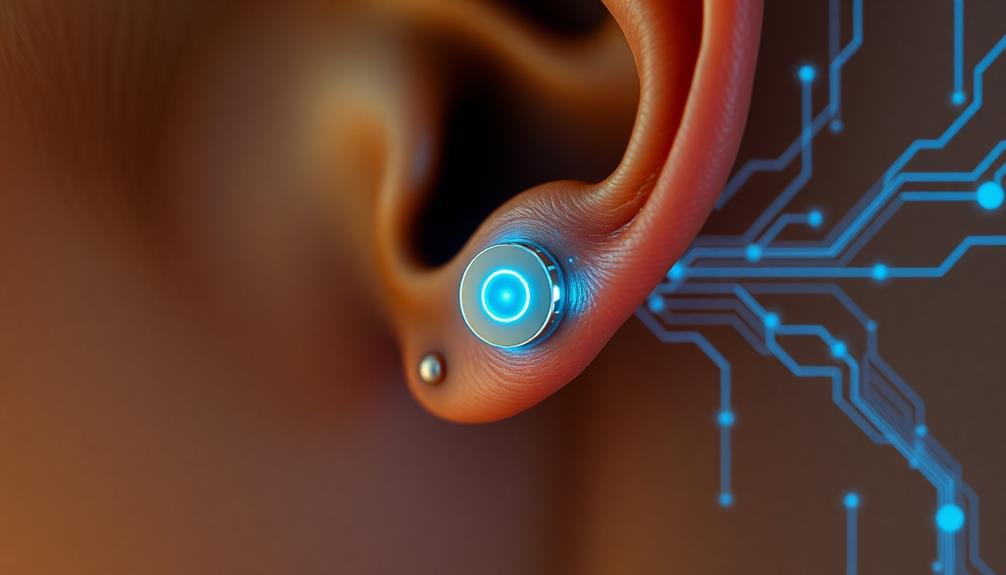Piercings can greatly boost your self-esteem, serving as a powerful form of personal expression. They often act as coping mechanisms, providing a sense of relief from anxiety and promoting feelings of empowerment. Each piercing symbolizes your unique journey, connecting you to your identity and enhancing your confidence. Many people find joy in sharing their body art, which fosters a sense of belonging to like-minded communities. While there are health risks and social challenges to take into account, the psychological benefits of body modifications often outweigh these drawbacks. Want to explore how piercings influence self-image and social acceptance even further?
Key Takeaways
- Body modifications like piercings serve as coping mechanisms, providing temporary relief from emotional distress and enhancing self-connection.
- Positive body image linked to piercings boosts self-esteem, allowing for personal expression and empowerment against societal pressures.
- Cultural significance of piercings fosters identity and belonging, marking rites of passage and individuality across diverse communities.
- Each piercing symbolizes personal growth and defiance against norms, reinforcing individual narratives and boosting confidence.
- Awareness of health risks and social consequences is crucial for informed decisions about body modifications, aligning with personal identity and self-esteem.
Body Modifications as Coping Mechanisms
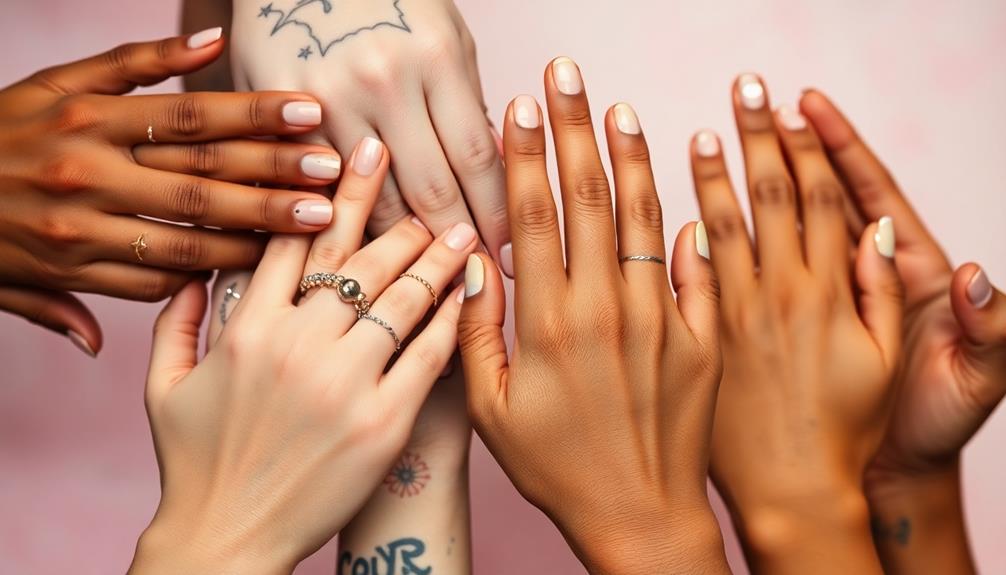
Body modifications can serve as powerful coping mechanisms for many individuals grappling with anxiety and depression. When you choose to get piercings or other body modifications, you might experience temporary relief from overwhelming emotions. The process often triggers a dopamine release, creating euphoric moments that help you escape social deficits and internal turmoil.
Visible body modifications, like piercings, often symbolize personal growth and change. Each piercing can represent a step forward in your journey, marking progress amidst emotional challenges. The control you exert over your body through these modifications fosters a sense of agency, empowering you and positively impacting your self-esteem.
For those undergoing gender alteration, piercings can hold even deeper significance. They often represent measurable milestones, reinforcing your evolving identity and enhancing your psychological well-being.
Impact of Body Image on Self-Esteem
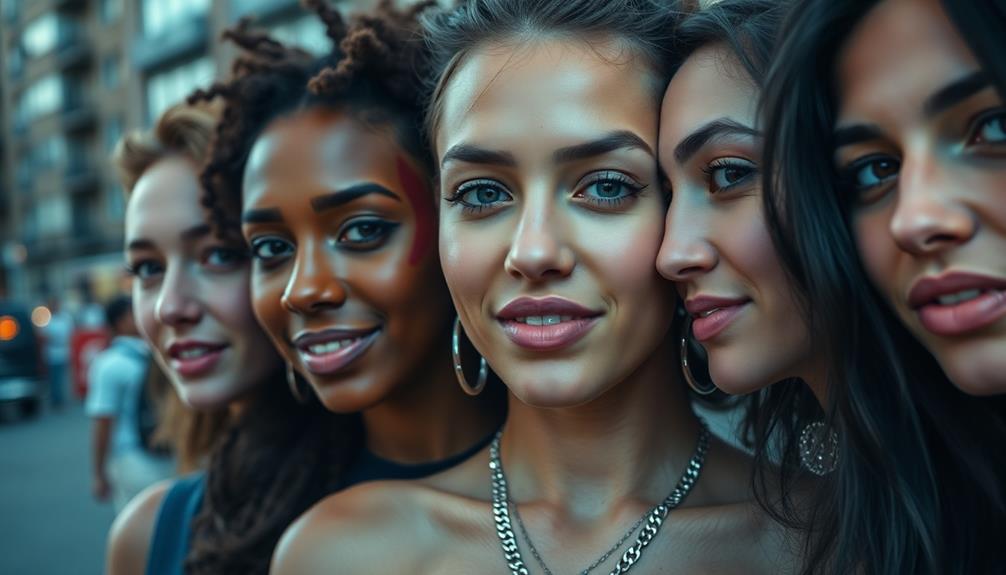
Your body image plays an essential role in shaping your self-esteem, often dictating how you feel about yourself on a daily basis. When you perceive your body positively, you're likely to experience higher self-worth and confidence. This connection is particularly evident in the context of body modifications, like piercings, which can serve as a form of self-expression and personal empowerment. Many individuals find that these modifications enhance their body image, contributing to a more positive self-esteem.
Additionally, the importance of clear communication during a breakup can extend to discussions about body image and modifications, as sharing your feelings can foster understanding and support.
However, societal acceptance and stigma can complicate this relationship. While the body positivity movement advocates for the acceptance of diverse body types, stigma surrounding body modifications can lead to feelings of vulnerability and shame, especially if you face judgment for your choices.
Research shows that self-esteem can fluctuate based on how accepted you feel in society. Engaging in body modifications may empower you, but it also means traversing complex feelings related to your body image.
Ultimately, your self-esteem is deeply intertwined with how you view your body and the societal narratives that shape those perceptions. Embracing body positivity can be key to overcoming stigma and fostering a healthier self-image.
Cultural Significance of Piercings
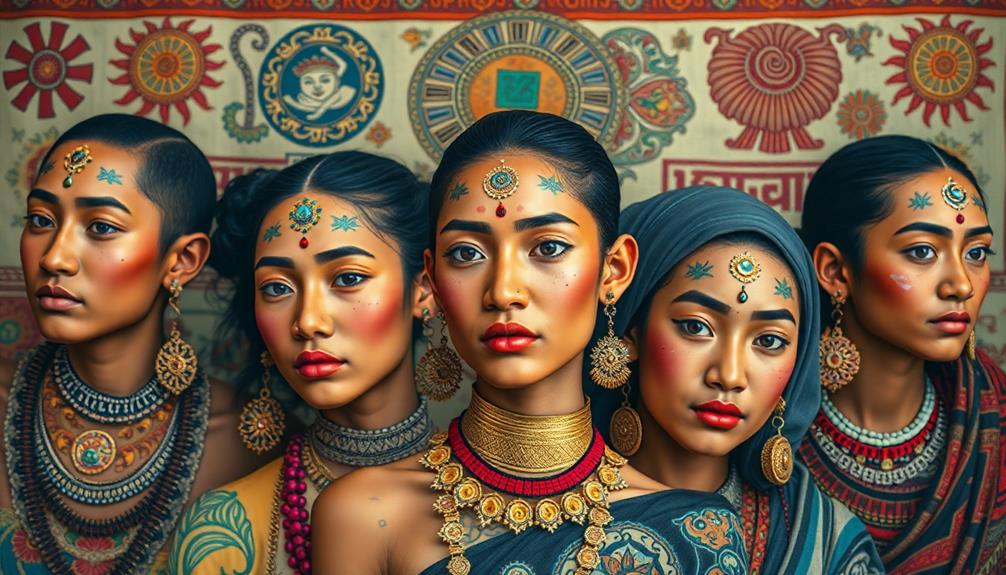
When you consider piercings, it's clear they hold deep cultural significance rooted in history and tradition.
Many societies have used piercings as rites of passage, marking identity and status within their communities.
Today, they serve as powerful symbols of self-expression, allowing you to challenge norms and showcase your individuality.
Historical Context and Practices
Throughout history, piercings have played a significant role in various cultures, often serving as markers of identity and belonging.
These body modifications date back thousands of years, with evidence found in ancient civilizations across Asia, Africa, and the Americas. The significance of piercings extends beyond aesthetics; they've been integral to rituals and social structures.
Here are some key aspects of their cultural importance:
- Initiation Rites: Piercings often signify changes such as adulthood or tribal affiliation.
- Spiritual Significance: Many cultures consider piercings a way to connect with spiritual beliefs and practices.
- Social Identity: They can indicate community membership or status within a group, reinforcing a sense of belonging.
- Beauty Standards: In various societies, specific piercings reflect ideals of beauty and self-expression, showcasing individual preferences.
As fashion trends evolved, so did the acceptance of piercings, particularly facial ones, among younger generations.
This shift reflects changing perceptions of body modifications, where piercings become expressions of identity, beauty, and personal values rooted in history and culture.
Identity and Self-Expression
Piercings have evolved from cultural markers to powerful tools for self-expression and identity. You can use piercings to showcase your individuality and personal beliefs, transforming your body into a canvas that reflects your unique cultural narratives.
Historically, body modifications like piercings have signified rites of passage, social status, and even rebellion against societal norms, fostering a sense of belonging within specific communities.
Research shows that individuals with body piercings often experience higher self-esteem and body confidence. By embracing these modifications, you assert your identity and challenge conventional beauty standards, empowering yourself in the process.
The growing acceptance of piercings in mainstream culture has shifted perceptions, allowing for a broader range of self-expression without the stigma that once accompanied body modifications.
Moreover, each piercing can serve as a form of personal storytelling, representing unique experiences, milestones, or emotional significances in your life.
This rich tapestry of identity not only enhances your self-image but also connects you to a wider community that shares similar values and experiences. In this way, piercings become much more than mere decorations; they embody your journey and the essence of who you are.
Identity Expression Through Body Art
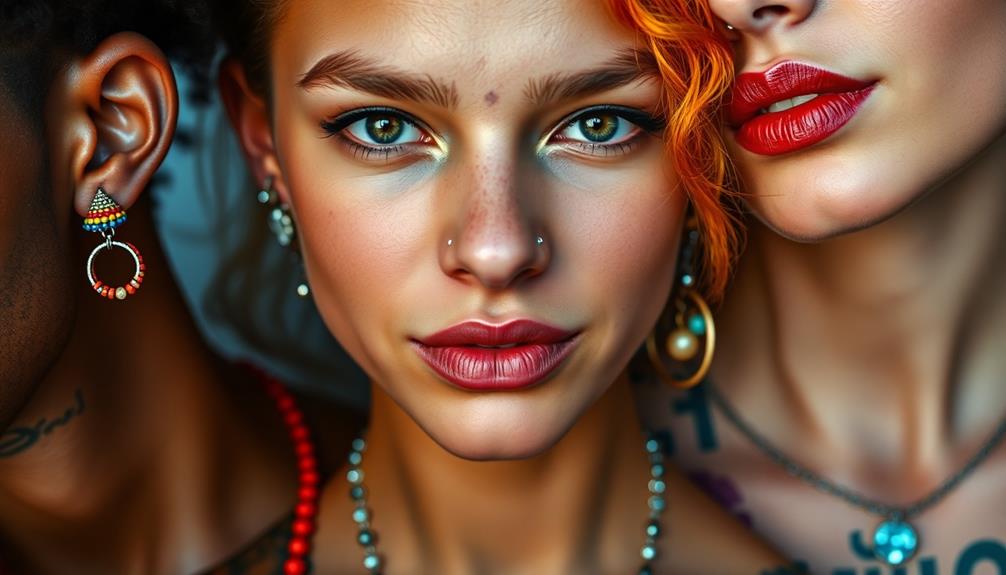
Body art allows you to express your identity in a deeply personal way, often serving as a canvas for your unique narrative. Through body modifications like piercings, you communicate your values and individuality. This form of identity expression can enhance your self-esteem and empower you, making you feel more aligned with who you truly are.
Here are four key reasons why body art is essential for identity expression:
- Personal Narrative: Each piercing tells a story, reflecting your experiences, beliefs, and passions.
- Need for Uniqueness: Studies show that individuals with body modifications often desire to stand out, fostering a sense of individuality.
- Cultural Rebellion: Piercings can symbolize defiance against societal norms, allowing you to embrace your distinct identity.
- Emotional Regulation: Body modifications can provide a means to cope with trauma, enabling you to express emotions that words may fail to capture.
Ultimately, body art plays a crucial role in shaping your sense of self, reinforcing the connection between your physical appearance and personal identity.
Psychological Effects of Body Modifications
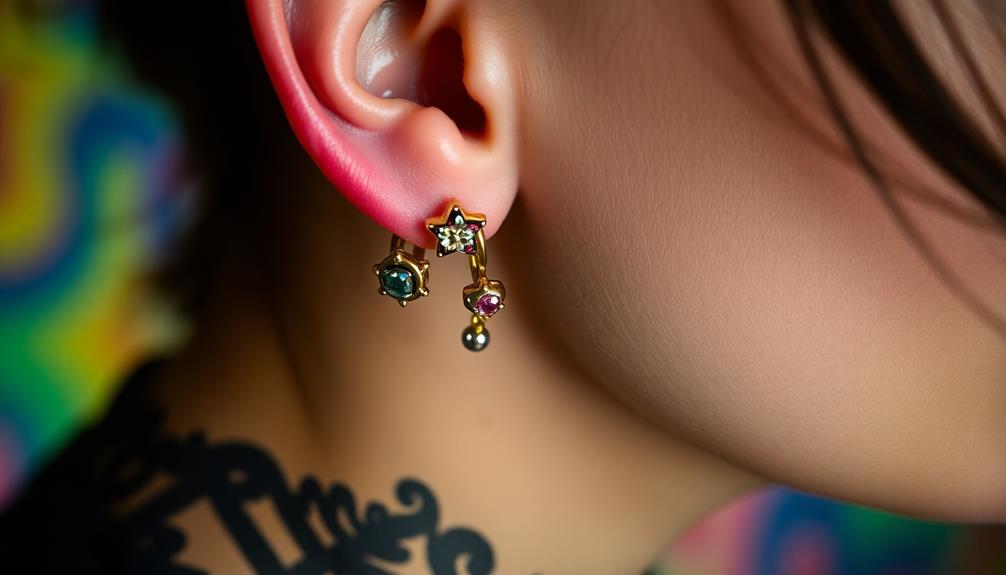
When you modify your body, whether through piercings or other forms, it can serve as a powerful coping mechanism for emotional distress.
This act not only allows for creative self-expression but also helps you reclaim your identity and sense of control.
Many find that these modifications provide a unique outlet for their feelings, fostering a deeper connection with themselves.
Coping Mechanism Benefits
Many individuals find that body modifications, such as piercings, serve as effective coping mechanisms for dealing with emotional distress.
These modifications can provide temporary relief from anxiety, shame, and depression, helping you navigate challenging feelings.
Curiously, just as certain foods can be beneficial or harmful to our pets, the choices we make about our bodies can also reflect our desires for safety and well-being; for example, grapes are toxic to dogs but fruits like apples can be nourishing.
Here are some key benefits of using piercings as a coping strategy:
- Dopamine Release: The process of getting a piercing triggers dopamine production, creating euphoric moments that uplift your mood.
- Tangible Markers of Growth: Each piercing can symbolize personal growth and transformation, reminding you of your progress during tough times.
- Empowerment: Modifying your body gives you control over your appearance, fostering a sense of agency that boosts self-esteem.
- Alleviating Anxiety: For individuals undergoing gender transition, piercings can serve as milestones that ease anxiety related to social acceptance.
Identity and Expression
Piercings not only serve as coping mechanisms but also play a significant role in shaping identity and self-expression. When you choose body modifications like piercings, you communicate your personal narrative and values, enhancing your self-esteem in the process.
Many individuals report a heightened need for uniqueness, which fosters a sense of individuality and empowerment, especially in a society that often values conformity.
Getting piercings can trigger endorphin release, creating euphoric feelings that boost your self-regard. This positive reinforcement can lead to repeat behaviors, as you seek to replicate those uplifting experiences.
Furthermore, piercings symbolize personal growth and transformation, acting as markers of strength and confidence. They reflect your journey in maneuvering identity amidst external societal pressures.
For those with adverse childhood experiences, body modifications can reclaim body autonomy and facilitate emotional healing. By embracing piercings, you assert control over your identity and express who you truly are.
Ultimately, piercings become a powerful tool for self-expression, allowing you to celebrate your individuality while reinforcing your self-esteem and contributing to your personal growth.
Risks and Challenges of Piercings

Often, people underestimate the risks and challenges that come with getting piercings. While body modifications can enhance your self-esteem, they also carry potential downsides that can affect your mental and physical health.
Here are some key risks to take into account:
- Infections: Poor aftercare can lead to painful infections, impacting your self-image.
- Allergic Reactions: Some materials can cause allergic reactions, leading to discomfort and regret.
- Emotional Distress: Excessive modifications may indicate underlying issues, complicating your relationship with self-esteem.
- Societal Stigma: Visible piercings may result in discrimination, creating additional stress in professional or social settings.
Engaging in piercings as a coping mechanism for emotional struggles can blur the line between self-care and impulsive choices.
It's vital to practice informed decision-making to guarantee that your body modifications align with your evolving identity. By understanding these risks, you can better navigate the challenges of piercings and their potential impact on your self-esteem.
Social Acceptance and Belonging
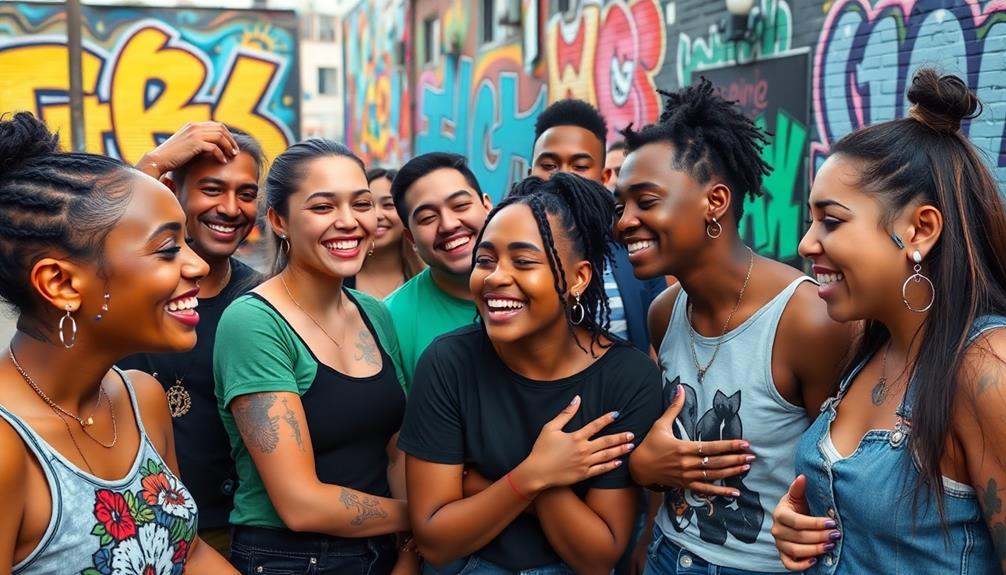
In today's world, body modifications like piercings have become symbols of individuality and self-expression. As society increasingly embraces these modifications, you may find that they foster a sense of social acceptance.
Particularly among younger generations, piercings can enhance your self-esteem by representing personal expression and affirming your unique identity.
Research shows that individuals sporting piercings often report feeling a stronger community identity. These modifications can symbolize shared experiences, helping you connect with like-minded individuals who appreciate diverse appearances.
The stigma surrounding body modifications has notably decreased, thanks to media visibility and body positivity movements that promote inclusivity.
The psychological implications of wearing piercings are remarkable, too. They can serve as a coping mechanism for social anxiety, providing you with a tangible way to assert your uniqueness in various social circles.
By embracing piercings, you not only celebrate your individuality but also tap into a community that values acceptance and connection.
Ultimately, body modifications like piercings can considerably impact your self-esteem and sense of belonging, making it easier to navigate today's diverse social landscape.
Empowerment Through Body Modification

Embracing body modification can be a powerful way to assert your identity and challenge societal norms. When you choose to get piercings or other body modifications, you take control of your body and enhance your self-esteem.
This journey often leads to profound personal expression and a fulfilling sense of empowerment. Here are some key benefits you might experience:
- Enhanced Self-Esteem: Many individuals report feeling more confident after making body modifications.
- Psychological Relief: The process of getting piercings releases dopamine, leading to feelings of euphoria and a break from anxiety.
- Need for Uniqueness: Body modifications allow you to express your individuality, distinguishing you from societal expectations.
- Community Belonging: Engaging in body modification often connects you with others who share similar experiences, creating a supportive network.
Frequently Asked Questions
Are Piercings Considered Body Modifications?
Yes, piercings are considered body modifications. When you choose to get a piercing, you're making a semi-permanent alteration to your body, often to express your individuality or enhance your personal style.
What Is the Psychological Reason for Piercings?
You might seek piercings for various psychological reasons, such as self-expression, coping with emotional distress, or enhancing your sense of identity. They can empower you, help you communicate feelings, or simply reflect personal style.
Do Piercings Boost Self-Esteem?
Studies show that around 70% of individuals with body modifications report higher self-esteem. If you get piercings for personal expression, they can boost your confidence and help you feel more connected to your unique identity.
Is Getting Piercings a Coping Mechanism?
Yes, getting piercings can be a coping mechanism. You might find that the process provides a temporary escape from emotional distress, allowing you to express yourself and regain a sense of control over your body.
Conclusion
In exploring the intricate relationship between piercings and self-esteem, you might find that your body modifications serve as a canvas for personal expression and resilience. Coincidentally, as you embrace your unique identity through body art, you discover a newfound sense of empowerment that transcends societal norms. While challenges exist, the journey of self-discovery through piercings can foster a deeper connection to yourself and a community that values individuality, ultimately enhancing your self-esteem and sense of belonging.
Hi, my name is Danielle, and I’m an author for piercings-body.com. I have a passion for writing and love to share my knowledge on all things body piercing-related. I’m also a huge advocate for safe body modification practices and believe everyone should be able to make informed decisions about their bodies. When I’m not writing or blogging, I enjoy spending time with my family and friends, practicing yoga, and exploring new places.

